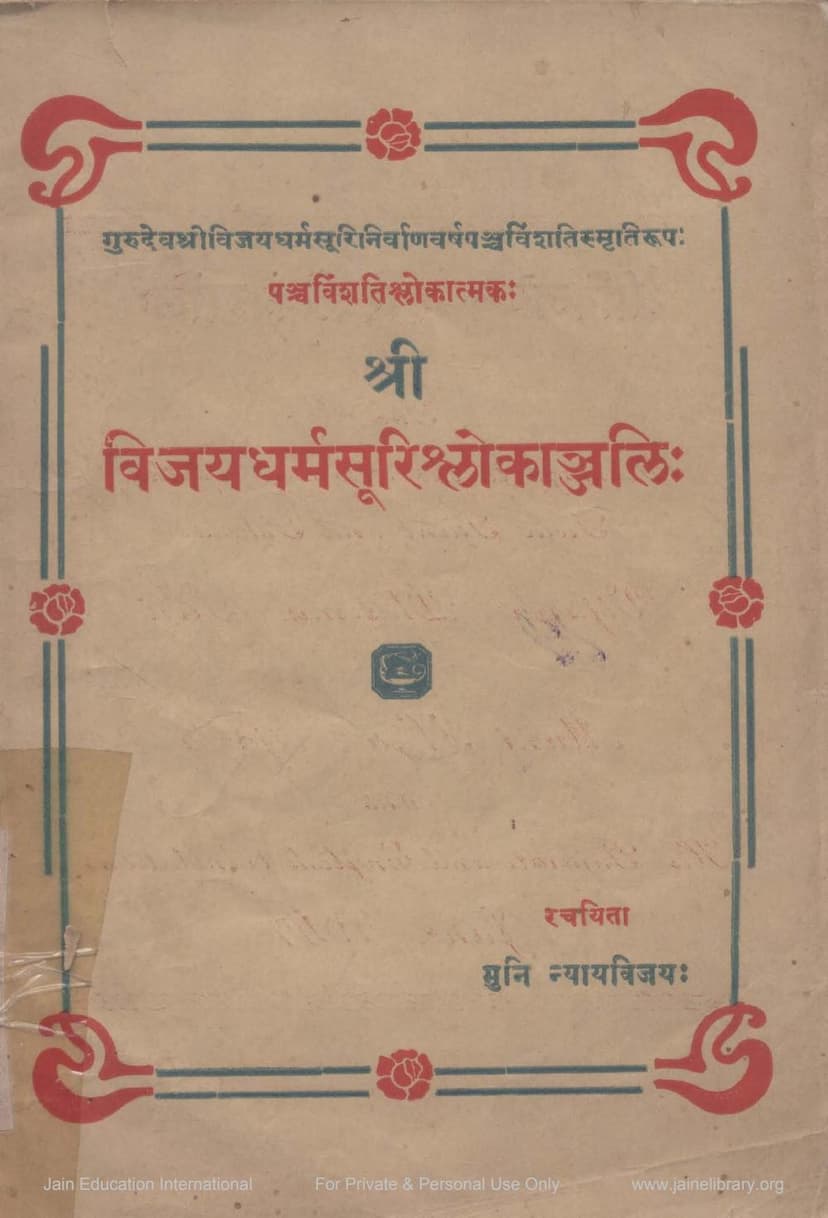Vijay Dharmsuri Shlokanjali
Added to library: September 2, 2025

Summary
Here is a comprehensive summary of the Jain text "Vijay Dharmsuri Shlokanjali" by Nyayavijay, based on the provided pages:
Book Title: Vijay Dharmsuri Shlokanjali (Homage to the Memory of the Great Saint and Scholar Vijaya Dharma Suri) Author: Muni Nyayavijay Publisher: Bhogilal Chunilal Kapadia Date of Publication: June, 1947 (Vir Samvat 2473, Vikrami Samvat 2003)
Core Purpose: The book is a collection of 25 verses (Shlokas) composed by Muni Nyayavijay as a tribute to the memory of his revered Guru, Acharya Vijaya Dharma Suri, on the occasion of the 25th anniversary of his passing (Nirvana). It aims to commemorate the life, teachings, and significant contributions of this renowned Jain scholar and saint.
Key Aspects of Acharya Vijaya Dharma Suri's Life and Teachings as Depicted in the Text:
-
Early Life and Transformation:
- Born in Mahuva, Saurashtra (Kathiawar) to parents Ramachanda and Kamalā Devi of the Visā Shrimali Vaishya community.
- His original name was Mulachand.
- In his youth, he was reportedly prone to idle wandering and gambling, neglecting his studies and even his father's advice.
- A pivotal moment occurred when, after losing a significant amount of money in gambling and facing his father's severe reprimand, he experienced a profound awakening. This event marked a turning point, leading him to reflect on the vanity of the world and seek a spiritual path.
-
Spiritual Journey and Monastic Life:
- He left his village for Bhavnagar, where he met the esteemed saint Vriddhichandraji.
- Inspired by Vriddhichandraji's teachings, he resolved to renounce worldly life.
- At the age of nineteen, with his father's consent, he was initiated into the monastic order.
- He was given the monastic name Dharmavijaya.
- His monastic life was characterized by right conduct (Charitra yoga), unwavering devotion to his Guru (Guru bhakti nishtha), and diligent pursuit of knowledge (vidya adhyayana udyama), which led to his continuous spiritual and intellectual advancement.
- The text highlights that even a person with potentially less innate intellect could achieve great heights through strong determination and dedicated effort, using him as a prime example.
-
Contributions to Learning and Society:
- Education and Scholarship: He established a Sanskrit Pathashala (school) in Kashi (Benares) for the propagation of learning, producing brilliant scholars who benefited the country.
- Preservation and Promotion of Ancient Texts: He brought to light and published ancient texts on philosophical and spiritual knowledge, enriching Indian literature and revealing its profound richness.
- Intercultural Dialogue: He engaged in significant correspondence with Western scholars, promoting the greatness and grandeur of Arya (Indian) culture and philosophy in their countries.
- Spread of Ahinsa (Non-Violence): While traveling through regions like Kashi, Magadha, Anga, and Banga, he preached the principles of Ahinsa, successfully converting hundreds of cruel and meat-eating individuals to this path.
- Guidance to Rulers: He met with native Rajas (kings) in India and enlightened them on the duties of kingship (Raja Dharma).
- Promoting Cultural Unity: He sent his learned students to Lanka (Ceylon) to foster cultural unity with the Buddhist community there.
- Public Recognition: He was recognized and honored by prominent Indian scholars. He was also invited to speak at significant religious gatherings, such as the 'Sanatana Dharma Mahasabha' during the Kumbha Mela at Prayaga, where he was warmly received.
- International Recognition: He was acknowledged and respected by international scholarly societies, being elected as an Associate Member of the Asiatic Society of Bengal and an Honorary Member of German and Italian Oriental/Asiatic Societies, signifying his role as a bridge between East and West.
- Social Reform: He took action to stop the unholy practice of foreigners entering Jain temples on Mount Abu while wearing leather boots, by seeking intervention from the authorities.
- Academic Honors: He was honored with the prestigious title of "Acharya" (Shastravisharada Jainacharya) by a distinguished assembly of Indian scholars, including the Maharaja of Benares, recognizing his profound scriptural knowledge and scholarly acumen.
- Global Vision: He advocated for universal brotherhood and promoted the religion of humanity, dedicating himself to the spread of education.
-
Legacy:
- His enduring legacy includes the establishment of educational institutions: a Veer Tatva Prakashak Mandal in Shivapuri (Gwalior), a Jaina Gurukula in Palitana, and the famous Jnanamandira (public library) in Agra.
-
Qualities Praised:
- His knowledge was likened to the churning of the ocean of scriptures.
- His forbearance was like rain that quenches the fire of anger.
- His austerity (Brahmacharya) illuminated the earth.
- His self-restraint was widely eulogized.
- He was described as possessing brilliant effulgence, being inclined towards public welfare, like the moon to those with crooked minds, capable of extinguishing the fires of infatuation with the nectar of detachment, and appreciative of virtues in others.
Endorsements: The book includes glowing tributes from prominent international scholars like Sylvain Levi, F. W. Thomas, Hermann Jacobi, M. Winternitz, Helmuth von Glasenapp, Johannes Hertel, Sten Konow, J. Jolly, Franklin Edgerton, Heinrich Zimmer, and others, all recognizing his immense contribution to Jainism, Sanskrit studies, and his role as a bridge between Eastern and Western thought. They lauded his scholarship, his critical methods, his dedication to spreading knowledge, and his saintly character.
Overall Message: "Vijay Dharmsuri Shlokanjali" serves as a profound tribute to Acharya Vijaya Dharma Suri, a saint who rose from humble beginnings, transformed himself through repentance and dedicated spiritual practice, and went on to make significant contributions to Jainism, Indian culture, education, and social reform. The verses beautifully encapsulate his spiritual journey, his intellectual prowess, and his impact on the world, inspiring hope and reverence for his memory.